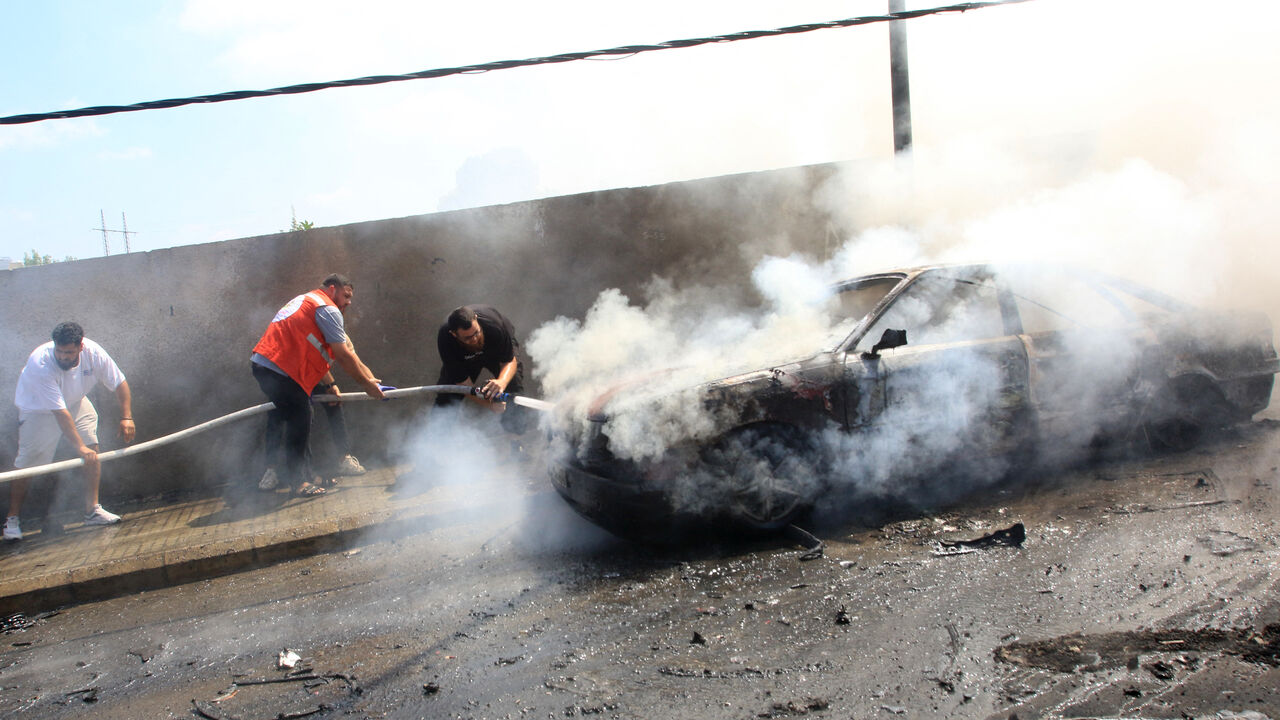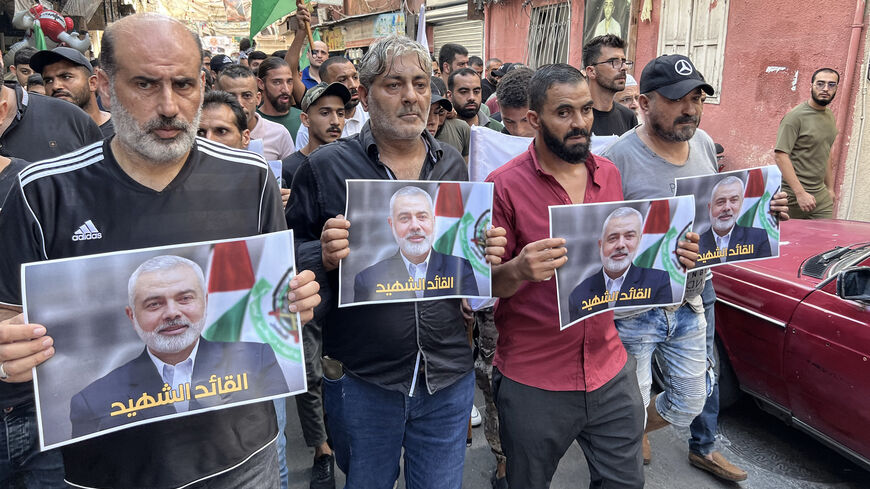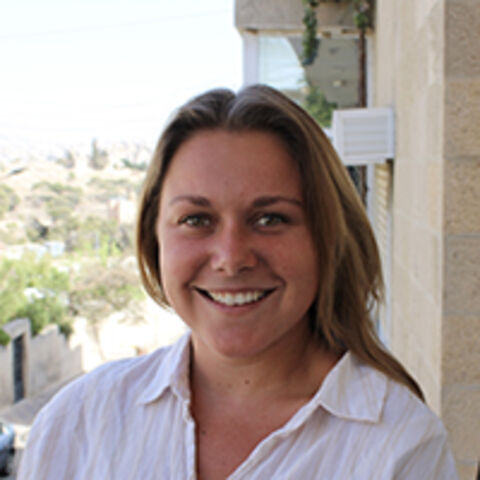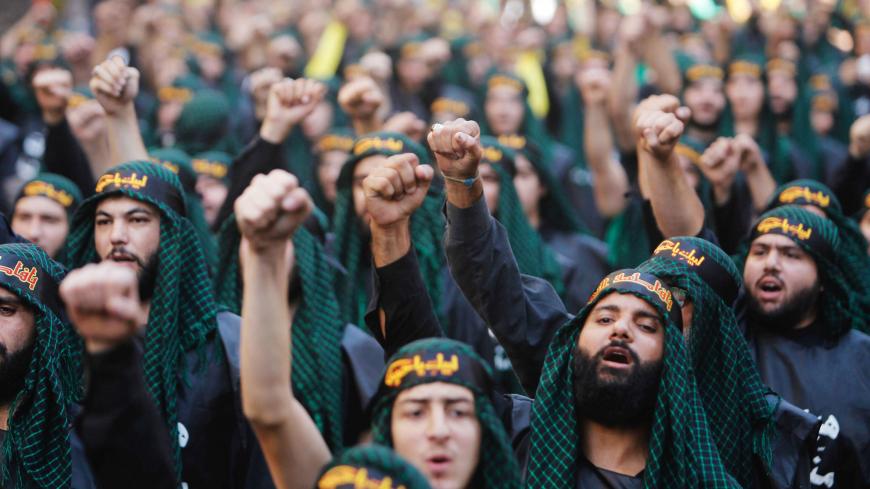Israel assassinates Fatah official in Lebanon, a first since Gaza war began
In a first since the Gaza war, a senior Fatah official was killed in an Israeli strike on Lebanese soil, as Israel-Hezbollah cross-border hostilities continue to escalate.

BEIRUT — A Fatah official was killed in an Israeli strike in Lebanon’s southern city of Sidon on Wednesday, the first member of the Palestinian group to be assassinated inside Lebanon since the Israel-Hezbollah hostilities began last October.
According to several reports, the Israeli drone strike hit a vehicle near the Palestinian camps of Ain al-Hilweh and Mieh Mieh in Sidon, killing Khalil al-Maqdah, who was identified as a commander in Al-Aqsa Martyrs Brigades, Fatah’s armed wing.
The brigades said Maqdah was killed in a “cowardly assassination operation” carried out by Israel while performing his duties as part of Al-Aqsa Flood, in reference to Hamas’ attack on southern Israel on Oct. 7 that triggered the ongoing Israeli offensive on the Gaza Strip.
In a press statement carried by several outlets, Al-Aqsa Martyrs Brigades praised Maqdah’s “central role” in supporting the Palestinian resistance and its affiliated groups inside the West Bank against Israel over the past years.
Maqdah’s brother, Maj. Gen. Munir al-Maqdah, who is the head commander of the Al-Aqsa Martyrs Brigades in Lebanon, also confirmed his brother's killing.
Speaking to Lebanon's Al Mayadeen news channel, he said that “assassinations make us stronger. This martyrdom is a badge of honor, and the resistance remains steadfast.”
The Maqdah siblings are both accused by Israel of working with Hezbollah and Iran’s Islamic Revolutionary Guard Corps for years.
عاجل / طائرات الاحتلال تغتال خليل المقدح ، نائب قائد كتائب شهداء الاقصى " الجناح العسكري لحركة فتح " في لبنان . pic.twitter.com/IbBOaAqYgB
— حركة فتح - الصفحة الرسمية (@fateh_pal65) August 21, 2024
The Israeli military said in a post on X that Khalil and Munir were responsible for transferring weapons and funds to the West Bank to carry out “terrorist attacks” against Israel. It accused them of recruiting residents in the West Bank via Iranian elements smuggled into the territory.
The post said that the Israeli strike targeted and killed Khalil in an operation jointly coordinated between the army and the Shin Bet in Lebanon’s Sidon.
Who is Khalil al-Maqdah?
Khalil was reportedly a retired brigadier general of Fatah and member of the movement’s Palestinian National Security. Khalil, along with his brother Munir, resided in the Ain al-Hilweh refugee camp in the southeast of Sidon.
In another statement cited by Al-Hurra television, Munir said his brother had been active since the 1960s and was one of the most prominent military commanders in the Al-Aqsa Martyrs Brigades.
Munir added that Khalil “was responsible for the logistics of Al-Aqsa Martyrs Brigades in the West Bank.”
The two brothers have been linked to the IRGC and its operations in Lebanon and the Palestinian territories.
Back in March, the Shin Bet announced that it foiled an Iranian attempt to smuggle advanced weapons into the West Bank. According to the Shin Bet, Munir was involved in the operation that was led by the IRGC’s Division 4000 and its Quds Force in Syria.
Khalil’s funeral was held in Ain al-Hilweh. A large crowd, including armed men, accompanied his body as he was being transported through the camp’s streets.
مشاهد لاستقبال جثمان الشهيد #خليل_المقدح في مخيم عين الحلوة.#لبنان #الميادين_لبنان pic.twitter.com/nEhAt9blIp
— الميادين لبنان (@mayadeenlebanon) August 21, 2024
Palestinians in Lebanon
Khalil’s killing marks the first attack in Lebanon to target a Fatah official since the cross-border hostilities between Iran-backed Hezbollah and Israel broke out Oct. 8, 2023, just one day after the war in Gaza began.
Israel has targeted several Hamas officials in Lebanon since then, most prominently Saleh al-Arouri, deputy head of Hamas' politburo, who was killed in a suspected Israeli strike in the southern suburbs of the Lebanese capital, Beirut, in January.
Another senior Hamas figure, Samer al-Hajj, who was reportedly in charge of security in Ain al-Hilweh, was killed in an Israeli drone strike in Sidon earlier this month.
Hamas, as well as smaller Palestinian and Lebanese armed groups, has occasionally claimed responsibility for rocket attacks launched toward northern Israel in the past 10 months in support of Hezbollah.
There are no reports that Fatah’s Al-Aqsa Martyrs Brigades carried out any attack against Israel from Lebanese territory. Fatah and Hamas have been bitter rivals since the latter took control of the Gaza Strip and removed all Fatah officials following violent infighting in 2007.
Fatah, meanwhile, controls the West Bank, where several armed groups have been proliferating and carrying out increasing attacks against Israel since the Gaza war erupted.
Lebanon hosts more than 489,000 Palestinian refugees, 45% of whom live in 12 camps established in the country following the 1948 Palestinian Nakba, according to the UNRWA. The UN and rights organizations have repeatedly deplored the poor conditions inside these camps. Meanwhile, the spread of heavy arms inside the camps has led to increased militancy.
The notorious Ain al-Hilweh camp, the largest in Lebanon and home to around 55,000 refugees, is the scene of regular violence between Fatah members and Islamist militants vying for influence and power.
Hezbollah-Israel escalation
Maqdah’s killing comes as fears of a wider war in Lebanon are growing following the killing of Hezbollah senior commander Fuad Shukr in an Israeli strike in Beirut’s southern suburbs late last month. Hezbollah has vowed a harsh response to the killing.
A former Lebanese minister, Marwan Hamadeh, said Wednesday he has information from Western diplomats involved in the negotiations on a Gaza cease-fire that war is “inevitable” and “will happen within a few days or hours.”
For his part, Tawfik Tirawi, a member of Fatah’s Central Committee, told Agence France-Presse on Wednesday that Israel’s killing of Maqdah in southern Lebanon is proof that it seeks to “ignite a full-scale war in the region.”









